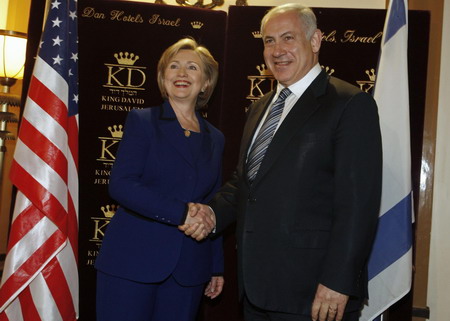In Jerusalem on Tuesday, Clinton said that working toward the creation of a Palestinian state as part of a peace agreement with Israel "seems inescapable."
 |
|
Israel's Likud party leader and prime minister-designate Benjamin Netanyahu (R) shakes hands with US Secretary of State Hillary Clinton before their meeting in Jerusalem March 3, 2009. Clinton pledged on Tuesday to press hard for Palestinian statehood, putting Washington on a possible collision course with Netanyahu. [Agencies]
|
But Abbas has little to show for a year of peace talks with Israel's outgoing government, and Israel's prime minister-designate, hardline leader Benjamin Netanyahu, does not support the establishment of a Palestinian state. Clinton met with Netanyahu, as well as Tzipi Livni and Ehud Barak, the outgoing foreign and defense ministers, on Tuesday.
Abbas aide Saeb Erekat said the Palestinian leader is seeking a tougher US stance toward Israel. "The main point is that the Israeli government needs to accept the two-state solution and ... stop settlement expansion," Erekat said.
He said Abbas would specifically raise Israeli construction plans in east Jerusalem, which the Palestinians want as their future capital.
The future of Hamas-ruled Gaza is also on the agenda. Abbas lost control of Gaza in June 2007, when his rival, the Islamic militant Hamas, seized control by force. Israel and Egypt closed Gaza's borders in response.
The blockade has come under renewed scrutiny following Israel's three-week military offensive against Hamas, which ended in an informal cease-fire January 18. Some 15,000 homes were destroyed or damaged in the war, meant to halt Palestinian rocket fire on southern Israel, and international aid officials say Gaza's borders need to reopen to make reconstruction possible.
"We want the US to help us open the passages to get material for reconstruction into Gaza," Erekat said.
In her meeting with Barak on Tuesday, Clinton urged easing the flow of goods into Gaza to alleviate the hardships of ordinary Gazans, Israeli officials said. They spoke on condition of anonymity because the talks were private.
Currently, Israel allows several dozen truckloads of aid to get into Gaza every day, but bars the entry of concrete, pipes and other materials that would be crucial for reconstruction. Israel argues that such shipments could be seized by Hamas and used for building bunkers or rockets.
The Gaza offensive did not end the rocket fire, and on Wednesday, Israeli aircraft struck three tunnels on the Gaza-Egypt border that militants are suspected of using to smuggle in weapons.
In Jerusalem on Tuesday, Clinton demanded that Hamas cease its rocket attacks, saying Israel should not "be expected to sit idly by and allow rockets (to) assault its people and its territory."
Hamas spokesman Fawzi Barhoum said Wednesday that Clinton's remarks throughout her Mideast trip have been "totally biased in favor of the Zionist occupation and do not reflect any change in American foreign policy."
Separately, Clinton also announced Tuesday that the US would dispatch two envoys to Syria in an effort to warm frosty relations - part of a bigger set of diplomatic maneuvers the Obama administration is juggling as it attempts to steer a new course toward a broad Middle East peace.

